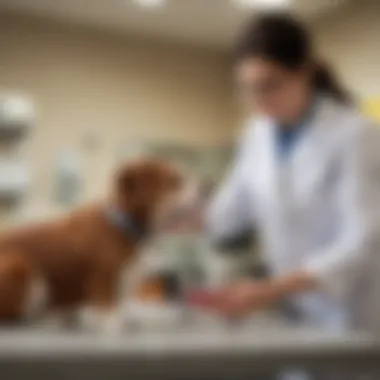Understanding Canine Diarrhea: A Comprehensive Guide


Intro
Canine diarrhea can be a perplexing issue for pet owners. When dogs exhibit diarrhea but seem otherwise healthy, it raises several questions about their well-being. Understanding this condition is essential for effective pet care. Knowing when to worry, the possible causes, and how to address the situation will help pet owners make informed decisions regarding their dog's health.
Understanding Your Pet
Breed Traits
Certain breeds may be predisposed to gastrointestinal issues, including diarrhea. For example, some small breeds like Yorkshire Terriers or Dachshunds are known to have sensitive stomachs. In contrast, larger breeds such as Great Danes or Boxers can also experience digestive problems, though often for different reasons, like rapid eating or slower digestion.
Common Temperaments
A dog’s temperament can influence how they respond to illness. Some dogs display calmness even when feeling unwell, while others may exhibit anxiety. Recognizing these behaviors is pivotal in assessing your dog's overall health when they encounter gastrointestinal disturbances.
Special Needs
Special dietary requirements may arise depending on the dog's breed and health status. For instance, dogs with pre-existing conditions may need tailored diets. Consulting with a veterinarian can offer guidance and help you understand what special needs your dog may have in relation to their digestive health.
Assessing Diarrhea in Your Dog
Understanding the symptoms of diarrhea and when they are concerning can influence how you respond to your dog's condition. Here are some aspects to consider:
- Duration: If diarrhea persists beyond 24 hours, it may require veterinary attention.
- Consistency: Pay attention to the type of diarrhea. Is it watery or is there blood? The latter can be alarming and should be assessed urgently.
- Accompanying Signs: Look for other symptoms such as vomiting, lethargy, or lack of appetite. These factors can indicate the severity of the condition.
It's important to monitor your dog's overall demeanor, especially when diarrhea occurs. Some pets can show normal behavior despite underlying health issues.
When to Consult a Veterinarian
Knowing when to seek veterinary care is critical. Consider the following factors:
- If diarrhea lasts more than 48 hours.
- If your dog appears dehydrated.
- If your pet has other systemic symptoms like fever or lethargy.
- If there is blood in the stool.
A veterinarian will perform a thorough evaluation, potentially recommending diagnostic tests to determine the underlying cause of the diarrhea.
Prevention Strategies
Preventing diarrhea in dogs often involves dietary and lifestyle considerations. Here are some steps to consider:
- Ensure a balanced diet suited to your dog's specific needs.
- Avoid sudden changes in food. Any transition should be gradual to minimize digestive upset.
- Regular vaccinations help prevent certain diseases that can lead to diarrhea.
Being proactive about your dog’s health can be instrumental in minimizing episodes of diarrhea. Monitoring their eating habits, reducing access to unfamiliar foods, and ensuring proper hydration are effective preventive measures.
Understanding canine diarrhea requires attention to detail and knowledge about your dog's specific traits. Propagating awareness and vigilance in pet care is the best strategy for managing this common yet concerning condition.
Prelude to Canine Gastrointestinal Health
Canine gastrointestinal health is a critical aspect of pet ownership that often receives insufficient attention. Understanding how a dog's digestive system works is essential for identifying and addressing issues, particularly when it comes to conditions like diarrhea. A healthy gastrointestinal tract supports adequate nutrient absorption and overall well-being. Furthermore, recognizing the signs of gastrointestinal distress can help in timely intervention, which is crucial for a dog's recovery.
Understanding Canine Digestion
Canine digestion involves a series of processes that convert food into energy. It begins in the mouth, where physical breakdown occurs. The salivary enzymes initiate the chemical breakdown of carbohydrates. From there, food travels down the esophagus to the stomach, where gastric juices continue digestion. In the stomach, proteins start to degrade due to the acidic environment.
Moving into the small intestine, the bulk of nutrient absorption takes place. Here, enzymes from the pancreas and bile from the liver further digest food components. The remaining undigested material then passes to the large intestine. This area is responsible for absorbing water and forming stool.
Understanding this process can help pet owners recognize when something goes wrong. Disruptions in digestion can lead to symptoms like diarrhea, even if the dog appears fine otherwise.
Common Gastrointestinal Issues in Dogs
Dogs can experience various gastrointestinal issues, each presenting distinct symptoms. Some of the most common problems include:


- Vomiting: This can range from occasional to frequent and may indicate an underlying condition.
- Diarrhea: Often linked to dietary changes, infections, or stress.
- Constipation: This may arise from dehydration or a lack of fiber in the diet.
- Bloating: A serious condition that can indicate gastric torsion.
Recognizing these symptoms can provide insight into your dog's overall health. Diarrhea can happen for many reasons, but distinguishing it from other issues is key to providing appropriate care. Keeping a close eye on your dog’s digestion and symptoms will help ensure a healthy life.
Defining Diarrhea in Dogs
Understanding diarrhea in dogs is critical for pet owners. Diarrhea can be a sign of underlying health issues, even if the dog appears otherwise healthy. Knowing how to identify diarrhea and its characteristics can help in making informed decisions regarding the dog's health.
Types of Diarrhea
Diarrhea in dogs is not a single entity but can manifest in different types, each indicating specific issues. Major types include:
- Acute Diarrhea: Sudden onset, often linked to dietary changes, infections, or after exposure to new environments.
- Chronic Diarrhea: Lasts more than two weeks, which may point to more severe gastrointestinal problems. Systemic diseases can be a factor.
- Large Bowel Diarrhea: Characterized by frequent, small amounts of feces mixed with mucus or blood, often due to colitis or infections.
- Small Bowel Diarrhea: Persistent, voluminous feces that may include undigested food, typically seen in disorders affecting nutrient absorption.
Understanding these types aids owners in describing the symptoms accurately to a veterinarian, facilitating timely and effective diagnosis.
Duration and Severity
The duration and severity of diarrhea are essential determining factors in assessing a dog's condition. The timeframe can indicate the urgency of veterinary attention needed.
- Acute Cases: Typically resolve within 24 to 48 hours without major intervention. Usually, if the dog remains active and hydrated, one can monitor at home.
- Chronic Cases: Persisting for more than a couple of weeks often necessitates veterinary evaluation. Dogs can lose vital nutrients and fluids, leading to serious health complications over time.
- Mild Severity: May present as occasional loose stool. Generally manageable at home with dietary adjustments.
- Severe Cases: Include persistent excessive diarrhea, potentially leading to dehydration and more alarming symptoms like lethargy and decreased appetite.
If diarrhea is prolonged or severe, it’s crucial to seek advice from a vet. Monitoring duration and recognizing severity can position owners to take the right steps effectively, possibly preventing escalation.
Always consider the dog's overall health, including hydration and behavior, when evaluating diarrhea. These elements can provide insights into whether the situation is manageable at home or requires professional care.
Identifying the Causes of Diarrhea
Understanding the underlying causes of diarrhea in dogs is critical for proper management and treatment. This knowledge empowers pet owners to make informed decisions regarding their dog's health and well-being. Knowing what may trigger diarrhea can help identify potential risks or necessary changes in daily care routines. Moreover, identifying causes aids in monitoring the health of the dog effectively, ensuring timely veterinary intervention if required.
Infections and Parasites
Several infections and parasites can lead to gastrointestinal disturbances in dogs. Common culprits include bacteria such as Salmonella and E. coli, as well as parasites like Giardia and roundworms. These infections can result in inflammation of the intestinal lining, leading to diarrhea.
Monitoring your dog for signs of infections involves observing any changes in behavior, appetite, and water intake. Diarrhea related to bacterial infections can be severe and sudden. If your dog shows symptoms like failure to eat, lethargy, or blood in stool, seek veterinary care promptly.
Some parasites may not always be visible in fecal matter but can still affect your dog significantly. Regular fecal tests are essential in maintaining your dog's overall health.
Dietary Factors
Dietary issues are common for dogs that experience diarrhea, as changes in diet can disrupt their delicate GI systems. Foods that are too rich, sudden swaps in feeding, or consumption of spoiled or toxic items can cause gastrointestinal distress.
To manage dietary factors, pet owners should take note of any recent changes in food. Keep a consistent diet, especially when transitioning to new food products. Gradual introduction can help ease the process. Furthermore, human foods pose risks, so it is crucial to monitor what your dog consumes. Foods like chocolate, grapes, and onions are known to be toxic for dogs and can lead to significant health issues, including diarrhea.
Stress and Environmental Changes
Dogs are sensitive creatures that may react adversely to stress or sudden changes in their environment. Situations like moving to a new home, changes in family dynamics, or even the introduction of new pets can create anxiety in dogs. Stress-induced diarrhea may not indicate a serious problem, but it is still concerning.
Identify any environmental changes that may correlate with the onset of diarrhea. Maintaining a stable environment can help minimize stress. Ensure your dog feels secure and provide comforting routines.
In summary, identifying the causes of diarrhea in dogs is vital for managing their health. Focusing on infections, dietary habits, and stressors can lead to better outcomes for your canine companions. Regular veterinary consultations are recommended to maintain optimal health.
When Your Dog Acts Fine
Understanding the situation when your dog has diarrhea yet seems to be in good spirits is crucial for pet owners. This scenario might create confusion and concern, as a normally playful dog displaying digestive issues raises questions about their health. Recognizing when a dog appears fine despite diarrhea can help in making informed decisions regarding care and potential veterinary visits.
Assessing the Overall Condition of Your Dog
To gauge your dog's health when they are experiencing diarrhea, it is essential to assess their overall condition. Look for signs beyond just where their stool quality is concerned. Key areas to consider include:
- Energy Level: Is your dog still active? A decline in energy may indicate an underlying issue.
- Appetite: Monitor whether your dog is still interested in food. A sudden change in appetite can be a red flag.
- Hydration Status: Dehydration is a serious concern with diarrhea. Check for dry gums and skin elasticity by gently pinching the skin and observing how quickly it returns to normal.
- Weight Changes: Sudden weight loss may signal a more severe problem. Regularly monitor your dog's weight, especially during episodes of diarrhea.


By staying alert to these factors, pet owners can better determine whether the situation is manageable at home or if a visit to the veterinarian is warranted.
Behavioral Indicators of Health
Behavioral changes can provide insights into your dog's health beyond their physical condition. Even when they appear fine, some behaviors warrant attention:
- Playfulness: If your dog maintains interest in play, it is often a good sign. However, a lack of enthusiasm for favorite activities can indicate discomfort or distress.
- Social Interaction: A healthy dog typically engages with humans and other animals. Withdrawal or aggression may signal that something is wrong.
- Bathroom Habits: Keep an eye on how often your dog goes outside, and whether they frequently show signs of urgency or discomfort. This can indicate the severity of their condition.
Knowing your dog's baseline behavior is key. If you notice any deviations, even if your dog appears fine, do not ignore them. This awareness can guide you in deciding if further evaluation is necessary.
The combination of physical assessment and behavioral observation forms a comprehensive view of your dog's health.
Self-Assessment Techniques for Pet Owners
Self-assessment plays a crucial role in managing canine health, particularly when your dog experiences diarrhea but appears otherwise normal. Being proactive allows pet owners to gather essential information that can inform their next steps. Understanding the condition can provide a sense of reassurance, as well as highlight when veterinary intervention is necessary. Self-assessment techniques empower owners to take charge of their dog's well-being.
Monitoring Stool Consistency and Frequency
Monitoring your dog's stool is an essential part of self-assessment. It involves observing not just the consistency but also the frequency of bowel movements. Normal canine stool is typically firm and sausage-shaped. When diarrhea occurs, the stool may become liquid or semi-liquid. Key points to consider:
- Consistency: If the stool is runny or liquid, it indicates diarrhea.
- Color: Healthy stool is often brownish. Different colors may suggest dietary issues or health problems.
- Frequency: A healthy dog typically has one to three bowel movements a day. If your dog defecates more than this, it can signal a change in health.
Frequent stooling can lead to dehydration. Noting how often your dog goes and the nature of the stool can give you valuable insights into their condition. Use a journal or an app to track changes, which can be very helpful during a vet visit.
Checking for Additional Symptoms
In conjunction with stool monitoring, checking for additional symptoms is important for comprehensive self-assessment. While your dog might seem fine overall, subtle indicators of distress or illness can emerge. Things to look for include:
- Vomiting: Frequent or severe vomiting along with diarrhea can indicate a more serious issue.
- Lethargy: If your dog appears unusually tired or disengaged, this can be a red flag.
- Appetite Changes: Watch if your dog's eating habits change. A lack of appetite might warrant further investigation.
- Fever or Pain: Touching your dog’s abdomen may help identify areas of discomfort or pain. You can use a thermometer to check for fever; normal canine temperature ranges typically between 101 to 102.5 degrees Fahrenheit.
Remember: Even if your dog appears fine, any combination of the above symptoms alongside diarrhea should prompt closer evaluation.
Using these self-assessment techniques enables pet owners to make informed decisions about their dog's health. The insights gained through consistent monitoring can signal when to seek veterinary assistance, ensuring that issues are addressed promptly, contributing to better outcomes for your pet.
Dietary Management During Diarrhea
Managing dietary choices during a dog's bout with diarrhea is crucial. Understanding what to feed a dog in distress can aid in recovery and restore gastrointestinal balance. This section examines effective dietary strategies to support a dog while dealing with diarrhea.
Recommended Dietary Changes
When a dog exhibits diarrhea but remains active and alert, dietary adjustments may provide recovery support. There are commonly recommended food choices to implement during this phase:
- Bland Diet: Typically consists of boiled chicken, rice, and plain pumpkin. These foods are easy on the stomach and help to firm up stools.
- Probiotics: Introducing probiotics can aid in restoring beneficial gut bacteria, which is crucial for digestion.
- Hydration: Dehydration can occur quickly due to diarrhea. Food that retains moisture, like wet food, may be more beneficial.
It's important to gradually reintroduce the dog's usual diet after symptoms improve. This process should be slow and monitored closely to avoid a recurrence of diarrhea.
Hydration Considerations
Dietary management during diarrhea also involves crucial hydration considerations. Diarrhea can lead to rapid fluid loss, making it imperative for the dog to maintain proper hydration levels. Here are key points to keep in mind:
- Fresh Water: Ensure that the dog has constant access to clean, fresh water. This is fundamental to replace fluids lost.
- Electrolyte Solutions: Sometimes, a pet-friendly electrolyte solution can assist in rehydration. Consult a veterinarian before introducing new solutions.
- Monitoring Urination: Keep an eye on the dog’s urination. Decreased urination may signify dehydration.
Maintaining hydration is as vital as managing diet during episodes of diarrhea; both aid in shortening the duration and preventing further complications.
In summary, attentive dietary management during a dog's diarrhea phase can significantly affect recovery. Owners must monitor both food intake and hydration closely. Always consult with a veterinarian for guidance tailored to the individual dog's needs.
Preventive Measures for Canine Gastrointestinal Health
Preventive care is crucial when it comes to maintaining canine gastrointestinal health. The gut plays a significant role in a dog's overall well-being. By implementing preventive measures, you can reduce the likelihood of your dog experiencing diarrhea and other gastrointestinal issues. This section outlines the importance of dietary management and regular veterinary visits as essential components of preventive care.


Maintaining a Balanced Diet
A balanced diet is fundamental for ensuring your dog’s health. The right nutrients support digestion and can help prevent gastrointestinal disturbances. Here are a few key considerations:
- Quality Ingredients: Providing high-quality food helps in avoiding gastrointestinal upset. Look for foods with named protein sources and minimal fillers.
- Age-Appropriate Food: Dogs have different nutritional needs depending on their life stage. Make sure to choose the correct formulation for puppies, adults, or seniors.
- Avoiding Sudden Changes: Introducing new food too quickly can upset a dog's stomach. Gradually mix new food with the old food over several days.
- Regular Feeding Schedule: Stick to a consistent feeding routine. This can help regulate digestion and may prevent issues related to overfeeding or hunger.
Overall, a suitable diet tailored to your dog's needs will promote a healthy digestive system and reduce the risk of diarrhea.
Regular Veterinary Check-ups
Regular veterinary check-ups are vital for monitoring your dog's health. These visits provide an opportunity for early detection of potential gastrointestinal issues. Consider the following:
- Routine Examinations: Regular vet visits enable your veterinarian to catch any health concerns before they escalate. This includes checking weight and overall condition.
- Vaccinations: Keeping your dog's vaccinations up to date can protect against diseases that may cause gastrointestinal distress, such as parvovirus.
- Preventive Parasite Control: Regular fecal exams and parasite prevention can help avoid complications related to worms and other parasites that can lead to diarrhea.
- Nutrition Guidance: Your vet can provide tailored advice about dietary choices, which is essential for maintaining gastrointestinal health.
Regular check-ups are a proactive way to ensure your dog's overall health and can catch potential issues early on.
When to Seek Veterinary Guidance
Understanding when to seek veterinary guidance is crucial for responsible pet ownership. Dogs can sometimes exhibit diarrhea without visible signs of distress. However, certain circumstances warrant professional evaluation. Recognizing these circumstances can help ensure your dog's health and well-being.
Veterinary guidance is particularly important for dogs with diarrhea that persists for more than a day. If your dog maintains normal behavior yet has frequent bowel movements, it may signal an underlying issue that requires attention. Dogs have different thresholds for gastrointestinal disturbances and factors like age, breed, and overall health can heavily influence recovery times.
Signs That Require Immediate Attention
Some specific signs indicate the need for immediate veterinary care:
- Blood in the stool: This may indicate a serious condition, such as intestinal parasites or infections.
- Severe lethargy: If your dog seems unusually tired or weak, this could signal dehydration or other complications.
- Vomiting: Frequent vomiting alongside diarrhea can quickly lead to dehydration and is cause for concern.
- Abdominal pain or bloating: If your dog exhibits signs of discomfort, such as whining or reluctance to move.
- Persistent diarrhea: If diarrhea lasts longer than 24 hours, regardless of other symptoms, a vet visit is necessary.
It is critical to take these signs seriously. Early intervention can make a significant difference in your dog's recovery.
Understanding Potential Risks
Dogs experiencing diarrhea can face numerous potential risks. Dehydration is the most immediate concern, especially in cases where diarrhea is frequent and severe. Dogs typically lose a lot of fluids, which can lead to serious health problems if not corrected. Signs of dehydration include:
- Dry gums
- Reduced skin elasticity
- Excessive thirst
Additionally, prolonged diarrhea can lead to nutrient deficiencies. If diarrhea persists, your dog may not be able to absorb essential nutrients, which could impair overall health over time. Conditions like pancreatitis, intestinal blockages, and infections are possible underlying causes. These can escalate if untreated, highlighting the importance of seeking veterinary guidance.
Recognizing symptoms and understanding risks will empower pet owners in maintaining their dog's health. It is better to err on the side of caution when it comes to your pet's well-being.
Remember, when in doubt, consult a veterinarian. Your dog's health may depend on it.
End: The Importance of Monitoring Canine Health
Monitoring the health of your canine companion is crucial, especially when faced with issues like diarrhea. It is not just about acknowledging the symptoms but also understanding their implications. By observing your dog's behavior and physical state, you can gain valuable insights into their overall wellbeing. This awareness can lead to timely interventions, which can be critical in preventing more serious health problems.
The importance of monitoring extends beyond just diarrhea. Healthy habits, such as regular check-ups and attentive observation, can help catch early signs of other underlying issues. This proactive approach enhances the quality of life for pets and can alleviate unnecessary distress for the owner.
Vigilance is key. Regular monitoring helps in identifying subtle changes in behavior or health that may signal a deeper issue.
Summarizing the Key Points
Through this article, several key points have emerged regarding canine diarrhea:
- Diarrhea in dogs can arise from various causes including infections, dietary changes, and stress.
- A dog appearing to be fine does not always mean there is no concern. Assessing their overall condition is vital.
- Self-assessment techniques are available for pet owners to monitor their dog's health more effectively.
- Maintaining a balanced diet and regular vet check-ups are essential preventive measures.
- Owners must know when to seek veterinary guidance, especially if signs of distress develop.
In summary, understanding the context and potential seriousness of diarrhea is crucial for managing your dog's health effectively.
Encouraging Proactive Pet Ownership
Proactive pet ownership involves being attentive to your dog's needs and health. This means not only recognizing symptoms but also taking action to prevent issues. Educating yourself about canine health and behavior can significantly impact your pet's wellbeing.
Here are some considerations to ensure a proactive approach:
- Stay informed about common health issues that may affect your dog's digestive system. Know the signs and symptoms related to gastrointestinal health.
- Implement routine check-ups with a veterinarian. Regular visits help in catching health problems early and promoting overall wellness.
- Monitor changes in your dog's diet and environment. Any sudden alterations can lead to gastrointestinal issues.
By adopting these practices, pet owners can create a healthier and more supportive environment for their furry friends. The focus should always be on prevention and awareness, ensuring that your pet remains healthy and happy.



